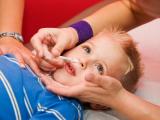Dec 23, 2009 (CIDRAP News) – Infection with H1N1 influenza poses a grave danger to pregnant women and those who have just delivered, and the risk increases when they do not receive antiviral treatment very rapidly, California and Atlanta researchers report today online ahead of print in the New England Journal of Medicine.
"This pandemic has the potential to notably increase overall maternal mortality in the United States in 2009," they write.
In surveillance data gathered by the California Department of Public Health between April and August 2009, early in the H1N1 pandemic, 22 of 102 pregnant and postpartum women who had been hospitalized for flu symptoms needed to be admitted to an intensive care unit (ICU), 16 were put on ventilators, and 8 died.
Twelve of the 18 pregnant women who required ICU care delivered their children, including one pair of twins, while hospitalized. Eleven of the 13 babies were premature and needed admission to a neonatal ICU. Six were delivered after ICU admission, including 4 babies delivered in the ICU by emergency cesareans—which the authors describe as "a relatively rare obstetrical occurrence [that] suggests that the condition of the patients was too unstable at the time for them to be transferred to an appropriate labor and delivery unit."
The four authors, who are from the California department and the Centers for Disease Control and Prevention (CDC)'s national centers for chronic disease prevention and for birth defects and developmental disabilities, are particularly concerned with the failure to get women onto flu antivirals within the recommended 48 hours after symptom onset.
Of the 22 who went into intensive care, 6 did not see health professionals until 5 days after their flu symptoms began; separately, 7 of the women did not receive antivirals until at least 4 days after seeing a healthcare provider.
The authors, all women, surmise that those delays may have occurred partly because pregnant women are reluctant to take drugs during pregnancy, and obstetricians are reluctant to prescribe them. In addition, they said, some signs and symptoms of flu, such as muscle aches and shortness of breath, may be mistaken for normal pregnancy experiences.
But they also point to misleading results on rapid flu tests that may have made antivirals seem less urgent. Out of 153 tests given to some members of the pregnant and postpartum group as well as to some members of a parallel group of 137 women who were not pregnant, 38% returned false-negative results.
"Pregnant women who received treatment after 48 hours had a risk of admission to the ICU or death that was about 4 times the risk among those who received earlier treatment," they said. Among pregnant women who received any antiviral treatment, only half began the drugs within the recommended time. Five of the 8 deaths among the pregnant and postpartum women were in those whose antiviral treatment was delayed.
Notably, they said, pregnant women with serious flu often arrived at doctors' offices or hospitals with mild or moderate symptoms and then experienced "rapid clinical deterioration … qualitatively different from the course of seasonal influenza."
The authors emphasize that the outsize risk flu poses to pregnant women does not end when the baby is delivered. Eight of the 102 cases of influenza and 2 of the deaths occurred in women who already had given birth. "The immediate postpartum period probably represents a transitional period during which the risk of severe disease is returning to, but has not yet reached, baseline," they said.
New CDC guidelines written during the pandemic call for empirical rapid antiviral treatment for women who have given birth up to 2 weeks earlier.
Illness and death also occurred among the 137 women who were not pregnant or postpartum but were hospitalized for flu, but they tended to be older than the pregnant and postpartum women, and were also almost twice as likely to have other underlying conditions such as asthma. Among the women who were not pregnant, 17 died.
Louie JK, Acosta M, Jamieson DJ, et al. Severe 2009 H1N1 influenza in pregnant and postpartum women in California. N Engl J Med 2009 (published online Dec 23) [Full text]



















